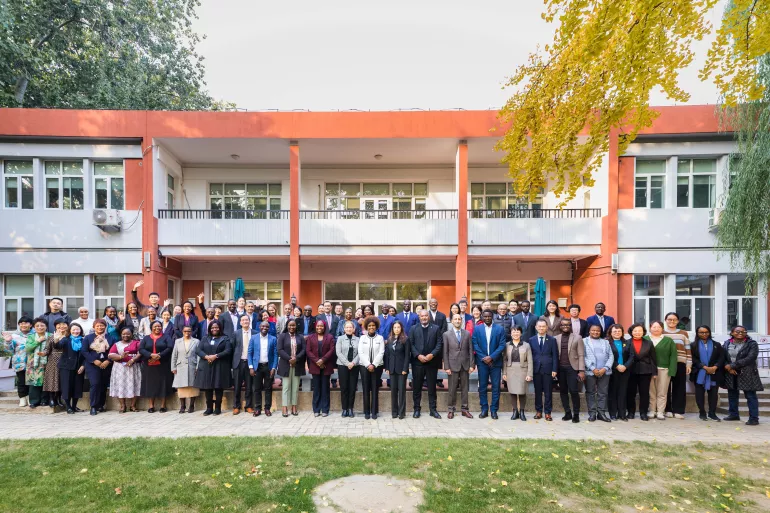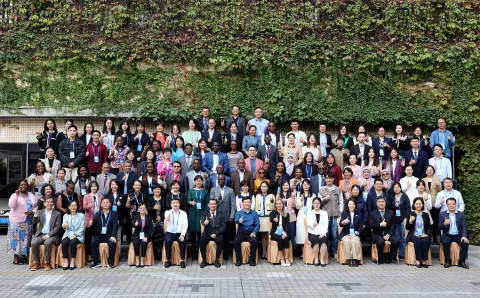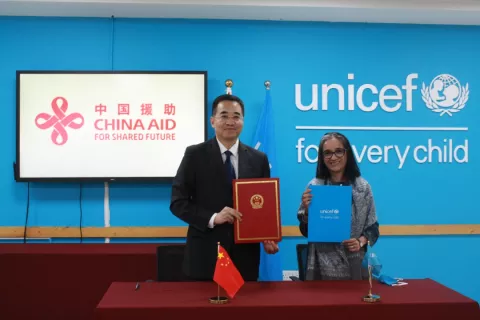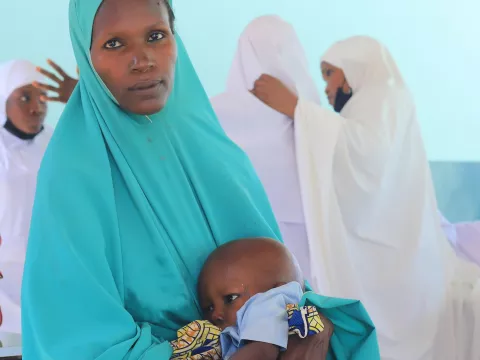Roundtable on South-South Cooperation in Maternal and Child Health Experience Exchange - China-Africa Health Cooperation

- Available in:
- 中文
- English
Beijing China, 24 November 2023 — Maternal and child health is an important aspect of China-Africa health cooperation. On 21 November 2023, the United Nations Population Fund (UNFPA) and the United Nations Children’s Fund (UNICEF) co-organized a roundtable discussion titled ‘A South-South Cooperation in Maternal and Child Health Experience Exchange’.
China and countries in Africa have collaborated on health for more than six decades. China has achieved noteworthy advancements in maternal and child health after years of experience and developing good practices. African countries have gained valuable experience in promoting maternal and child health in the face of challenges, including conflicts, strained resources, and climate change.
Promoting maternal and child health is crucial for achieving the Sustainable Development Goals (SDGs), especially Goal 3 and Goal 5, and adhering to the Programme of Actions of the International Conference on Population and Development (ICPD). In addition, promoting maternal health is aligned with the principles of the Convention on the Rights of the Child (CRC) to ensure the respect, protection, and fulfilment of children’s rights. Promoting maternal health also ensures women’s health and rights, maternal safety, child survival, and overall well-being.
“UNFPA recognizes that South-South cooperation plays a critical role in supporting countries to achieve the SDGs and the ICPD Programme of Action and we broker technical exchange and knowledge sharing across the 150 countries where we work,” said Dr Justine Coulson, the UNFPA Representative to China.
“South-South and triangular cooperation can play a vital role for experience sharing and learning from practical challenges as well as good practices. It is mutual, two-way cooperation that allows China and countries in Africa to learn from each other,” UNICEF Representative to China Amakobe Sande said at the roundtable.
The gathering brought together over 80 participants, including a diverse group of delegates from African countries who traveled to Beijing. Representatives from respective Ministries of Health, UNFPA, and UNICEF country offices, Ambassadors and officials from African embassies, representatives from Chinese health institutions, UN organizations, universities, and research institutions joined the roundtable.
A total of 27 African delegates representing 11 countries – the Central African Republic, Ethiopia, Gambia, Guinea-Bissau, Mauritania, Namibia, Sierra Leone, South Africa, Tanzania, Uganda, and Zimbabwe – participated in the roundtable discussion and shared their insights.
“Africa, a continent of immense diversity and potential, continues to face significant challenges in ensuring the well-being of mothers and children. It is imperative that we take stock of the current situation and identify the priorities for South-South cooperation to address the pressing issues that hinder progress in maternal and child health,” said H.E, Mme. Oliver Wonekha, Ambassador of the Republic of Uganda.
China has a wealth of experience in improving the health of women and children and promoting their safety. It has been recognized by WHO as one of the top ten countries in terms of maternal and child health performance.
“This roundtable marks the beginning of post pandemic South-South cooperation. The dynamic discussion and communication shows the desire of developing countries to understand each other, as well as their willingness to promote future collaborations,” shared Mr. Dong Shengli, Division Director of the International Cooperation Department, National Center for Women and Children Health, China’s National Health Commission.
Government leaders from the International Health Exchange and Cooperation Center, the National Health Commission and the National Center for Women and Children Health, National Health Commission shared an overview of China-Africa cooperation on maternal and child health and a review of maternal and child health work in China, highlighting the achievements that China has made in the survival development goals of lowering maternal and child mortality and the goals going forward.
The joint event provided a platform for the United Nations, China and African countries to discuss the current status and experiences of maternal and child health, and to enhance understanding of progress and challenges. It also promoted South-South and triangular cooperation in maternal and child health. Following the roundtable, a three-day study visit on maternal and child health will be held from 23-25 November in Nanning city in Guangxi Zhuang Autonomous Region.
Media contacts
About UNICEF
UNICEF works in some of the world's toughest places, to reach the world's most disadvantaged children. Across more than 190 countries and territories, we work for every child, everywhere, to build a better world for everyone.
| Visit UNICEF Global website: www.unicef.org Visit UNICEF China website: www.unicef.cn Follow us on Sina Weibo: http://weibo.com/unicefchina Wechat: unicefchina |




